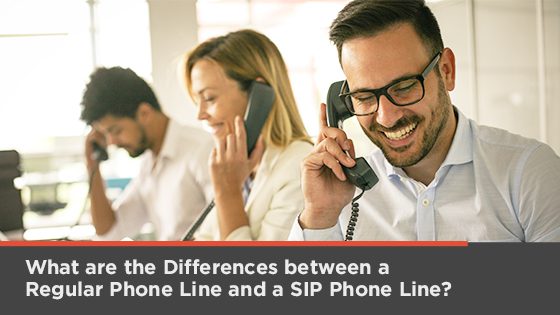Are you considering setting up a new office, upgrading an existing one, or simply looking for improvements that you can make? Then you should take a long hard look at your office phone lines.
After all, even in this day and age with new communication technologies popping up all the time, the phone is still one of the most popular ways to do business. It makes sense that your office phone lines must provide the quality and reliability you need.
Although the phone is still very popular, the technology behind the phone calls you have been making and receiving every day is continually evolving.
One of the new technologies changing the typical office phone system is called Session Initiation Protocol (SIP). You may also have heard of SIP phones referred to as VoIP, but while the two are closely related, they aren’t quite the same thing. SIP systems do enable voice calling over your IP, but they can also offer a host of other features such as video calling, instant messaging, media distribution and other applications.
What are SIP Phones?
SIP lines or SIP trunks are, at their most simple level, phones that use the internet instead of traditional phone lines to communicate with other people.
At first glance, SIP phones look just like ordinary telephones. There is a number pad, a handset, and sometimes a display for managing menu options or reviewing call history. The real technology isn’t in the handset itself but within the SIP lines running behind the scenes.
SIP phones use a typical Ethernet cable to connect to the internet and, with the high-speed internet being widely available, offer a quality that is on par with traditional phone lines.
As far as user experience goes, most people would not know the difference between SIP phones and a regular telephone by merely looking at the device or hearing the sound quality.
SIP Phones are Cost-Effective
One of the main reasons people consider connecting SIP phones to replace their existing traditional office phone lines is the cost of calling. This is especially true if you make a lot of long distance phone calls.
Costs can vary between service providers, but SIP lines often offer long-distance calling for as little as a few cents per minute.
You also can route calls through various offices within the company if you have multiple locations.
This type of technology is not available from traditional phone lines. Long-distance calling, especially international calls, can be a significant expense every month.
Some estimates suggest you could save 30% or more per month just by switching from a traditional phone to a SIP phone.
Increased Mobility with SIP Phones
Since SIP lines use the internet to connect, you don’t have to have traditional phone lines set up wherever you plan on making calls. In fact, some services offer a mobile app that allows you to take advantage of the SIP phone features wherever you may be.
Moving your traditional landline setup to a new location can be a costly decision. There could be a delay in having the service switched over, and you may need professional assistance to merely move your desk phones.
With SIP phones, moving is easy. Whether you are moving to a new office in the same building or moving across town; SIP phones need an internet connection to ensure you’re back up and running.
More Possibilities, More Efficiency
Does your landline provider offer additional services to help your business? Or, do you have to use a separate service and an internet connection to complete video conferences?
Landlines serve a single purpose: to make and receive phone calls. SIP lines, since they’re connected to the internet, can do a lot more than just audio phone calls. The fact that they are built on an internet connection also means that as new solutions and technologies pop up, they can be much more quickly (and inexpensively) integrated.
This flexibility is one of the best reasons to consider SIP phones in your office. You can increase the functionality and efficiency of your “phone” line while also potentially reducing costs significantly. It’s no wonder tens of thousands of Canadian business lines are leaving traditional phone providers every year.
Ready to Learn More about SIP Lines?
We have just scratched the surface when talking about SIP phones and the advantages they offer over traditional phone lines. If you want to read more about how a phone system can help improve the flexibility and efficiency of your business, check out our blog post on the difference between digital and IP phones.
Still, haven’t found the information you are looking for about SIP lines and how they could take your business to the next level? Reach out and ask us your question! We are here to answer your questions.
Cory Porteous
Marketing Manager
Office Interiors




